 Petzlover
Petzlover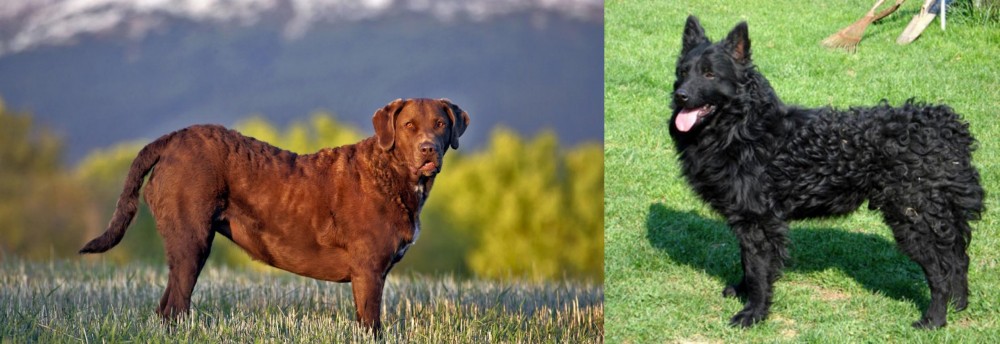 Chesapeake Bay Retriever is originated from United States but Croatian Sheepdog is originated from Croatia. Chesapeake Bay Retriever may grow 13 cm / 6 inches higher than Croatian Sheepdog. Chesapeake Bay Retriever may weigh 25 kg / 56 pounds more than Croatian Sheepdog. Both Chesapeake Bay Retriever and Croatian Sheepdog has almost same life span. Chesapeake Bay Retriever may have more litter size than Croatian Sheepdog. Chesapeake Bay Retriever requires Low Maintenance. But Croatian Sheepdog requires Moderate Maintenance
Chesapeake Bay Retriever is originated from United States but Croatian Sheepdog is originated from Croatia. Chesapeake Bay Retriever may grow 13 cm / 6 inches higher than Croatian Sheepdog. Chesapeake Bay Retriever may weigh 25 kg / 56 pounds more than Croatian Sheepdog. Both Chesapeake Bay Retriever and Croatian Sheepdog has almost same life span. Chesapeake Bay Retriever may have more litter size than Croatian Sheepdog. Chesapeake Bay Retriever requires Low Maintenance. But Croatian Sheepdog requires Moderate Maintenance
 Fondly referred to as the Chessie, the ‘Labrador-look-alike’ Chesapeake Bay Retriever’s history extends to St. Johns Newfoundland pups which were rescued off a ship off the coast of Maryland in 1807. The Chesapeake is an American breed.
Fondly referred to as the Chessie, the ‘Labrador-look-alike’ Chesapeake Bay Retriever’s history extends to St. Johns Newfoundland pups which were rescued off a ship off the coast of Maryland in 1807. The Chesapeake is an American breed.
It is believed that the Newfoundland puppies as they grew, were bred with area dogs, with there being few records of the early dogs, but it is believed that spaniels and dogs were included.
In 1918 the Chesapeake Bay Retriever was recognized by the American Kennel Club and in 1964 the dog was declared the official dog of Maryland.
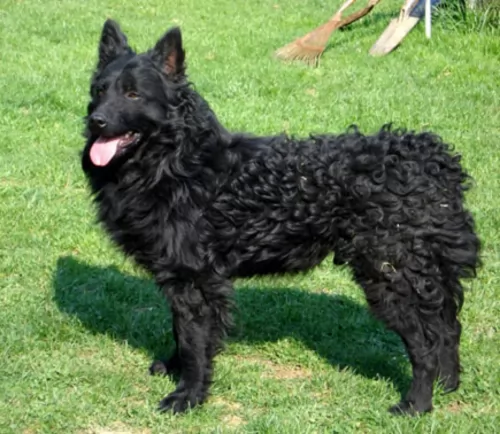 Known also as Hrvatski Ovkars, the black Croatian Sheepdog has been in Croatia since the 7th century already. He was brought to the region by Croats who wanted a strong working dog.
Known also as Hrvatski Ovkars, the black Croatian Sheepdog has been in Croatia since the 7th century already. He was brought to the region by Croats who wanted a strong working dog.
Over the centuries, the dog hasn’t changed much in looks, and in 1935 a breeding program for the dog was developed. A certain Dr. Romic started the program with 3 dogs, and the work he did with the dogs saw that the Croatian Sheepdog got official recognition a few decades later.
In March 1968, the Yugoslav Kennel Club adopted the breed standard, and since then, several kennels recognize the Croatian Sheepdog. The dog is still not known particularly well outside their own county, but in Croatia it is essentially known as a companion dog.
 The Chesapeake is a large dog belonging to the Sporting breed group. Perhaps one of the more distinctive features of the Chesapeake Bay Retriever is the yellowish eyes.
The Chesapeake is a large dog belonging to the Sporting breed group. Perhaps one of the more distinctive features of the Chesapeake Bay Retriever is the yellowish eyes.
This is a strong, well muscled dog that stands anywhere from 61 – 66cm and weighs between 30 – 45kg. The short, thick coat of the dog is waterproof and comes in colors ranging from brown to reddish yellow to chestnut shades.
The head of the Chesapeake is broad and roundish with medium length floppy ears. The tail is long. The toes are webbed which helps makes the dog an excellent swimmer as well.
The Chesapeake Bay Retriever is a happy kind of dog with a bright, alert, intelligent expression. He loves water and is guaranteed to make a wonderful pet for any family.
With his wonderful characteristics, it is worth training him and socializing him as this training sets parameters for him so that he becomes a wonderfully obedient dog that gets on well with other pets in the home as well as with children.
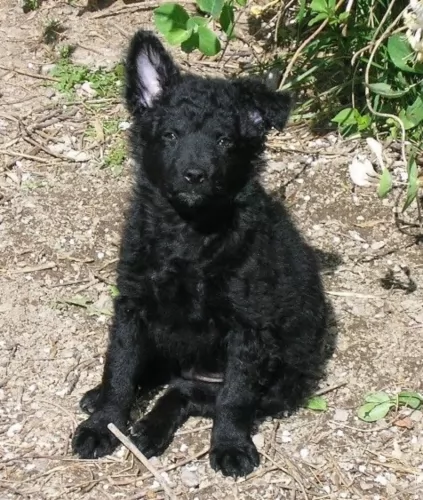 The Croatian Sheepdog is a medium sized, muscular dog which stands roughly 40 – 53cm at the withers and weighs 13 to 20kg. The head is wedge shaped and lean and he has brown to black colored eyes.
The Croatian Sheepdog is a medium sized, muscular dog which stands roughly 40 – 53cm at the withers and weighs 13 to 20kg. The head is wedge shaped and lean and he has brown to black colored eyes.
The triangular-shaped ears are medium sized and semi-erect or erect. The tail of the dog is often docked, but if not it is set high and is inclined to curl over the back.
The dog is nearly always black although you’ll find a few white hairs on the throat or chest or on the legs and toes. The double coat is of medium length, being wavy or even slightly curly.
The Croatian Sheepdog is an athletic, alert dog and he has high energy levels, loving to be put to work or to be busy with one or other activity. He fits in well as a family pet and gets on well with children and pets in the home, but he is going to need plenty of exercise and games.
This particular dog won’t do well with a family of couch potatoes as he craves lots of activities. He will certainly benefit from training and socialization, and because he is intelligent he learns easily and then he is obedient and ready to please.
He is a dominant, confident dog who thrives on attention from his human family. He isn’t a dog you can just stick in the backyard as he is social and craves activity and attention. He is wary of strangers and makes an excellent watchdog.
 The Chesapeake Bay Retriever is ready to be your best friend and companion. This dog breed is highly active and he’ll fit easily into a family that is active and can ensure he is involved in all their activities.
The Chesapeake Bay Retriever is ready to be your best friend and companion. This dog breed is highly active and he’ll fit easily into a family that is active and can ensure he is involved in all their activities.
The beauty about the Chesapeake Bay Retriever is that he is generally an even tempered dog, and once trained and socialized, becomes a truly splendid pet, one that will be loving and loyal with his owners.
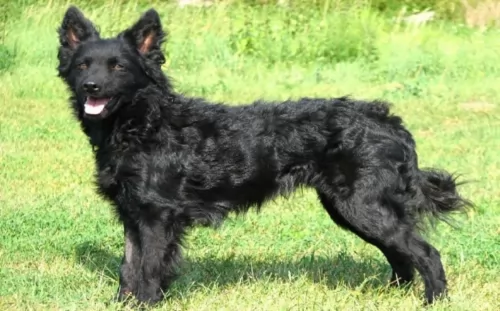 The Croatian Sheepdog isn’t a demanding dog, although he will be relying on you to give him plenty of exercise. He wants to please and will fit into life in the city or life in the country, so long as he gets regular exercise.
The Croatian Sheepdog isn’t a demanding dog, although he will be relying on you to give him plenty of exercise. He wants to please and will fit into life in the city or life in the country, so long as he gets regular exercise.
It doesn’t take much to keep the Croatian Sheepdog happy and content, and when he thrusts his wet nose into your hand and you see his wagging tail, you’ll know its all been worth it to give this pet the best as he gives you his undivided love and loyalty.
 By taking good care of your Chesapeake, you can ensure his teeth remain strong, his nose is wet and his coat glossy and healthy. He is a robust breed as it is, but there are always some common dog diseases to watch out for -
By taking good care of your Chesapeake, you can ensure his teeth remain strong, his nose is wet and his coat glossy and healthy. He is a robust breed as it is, but there are always some common dog diseases to watch out for -
Obesity is an ailment that is afflicting many humans and their pets. Being overweight can bring on a host of unwanted diseases. Obesity is a serious disease that can contribute to digestive disorders, back pain, heart disease and joint problems.
Instead of showering him with little treats to show him how much you love him, rather stroke him or play a game with him – it’s the ultimate treat for him – your attention.
Remember that if you aren’t going to let your Chessie become a parent, the best thing you can do for your male or female is to have them spayed or neutered. In fact, spaying or neutering can decrease the likelihood of your pet getting certain types of cancers as well as other illnesses. Speak to your vet and discover how these procedures can be very beneficial for your pet.
 The Croatian Sheepdog is a healthy dog breed. He is the kind of pet that won’t cost you a lot of money because he is low maintenance. In fact he is a dog which has developed resistance to many diseases.
The Croatian Sheepdog is a healthy dog breed. He is the kind of pet that won’t cost you a lot of money because he is low maintenance. In fact he is a dog which has developed resistance to many diseases.
With good food, exercise and love and care he won’t cost you much in terms of vet’s fees. He can live to be 12 to 15 years of age.
Even though he is a healthy kind of dog, there are some dog illnesses that you will want to be aware of such as bloat and eye problems. Also if you aren’t going to let him become a parent, then spaying or neutering your Croatian Shepherd will have numerous health benefits for him.
 The Chesapeake Bay Retriever sheds fairly heavily throughout the year. The coat should be brushed at least twice a week to remove dead hair. Brushing is good for the dog too as it distributes the oils of the skin, making his coat shinier.
The Chesapeake Bay Retriever sheds fairly heavily throughout the year. The coat should be brushed at least twice a week to remove dead hair. Brushing is good for the dog too as it distributes the oils of the skin, making his coat shinier.
Because the Chesapeake has floppy ears, the ears will need to be checked on a weekly basis for signs of infection. This is of particular importance if your Chessie loves to spend time splashing around in water. The veterinarian can recommend and also advise on cleaners for your dog’s ears.
An excellent diet and plenty of exercise will ensure your Chessie can live to be 11, 12 or 13 years of age. You want to keep his diet of kibble, rice, vegetables and meat consistent so as not to upset his stomach.
Avoid giving him foods such as chocolates. Do research on the harm you can do to your pet when you feed him some human foods that are entirely not meant for a dog’s digestive system.
The Chesapeake Bay Retriever has always loved to be active - hunting for- and retrieving birds from rivers and lakes. He is used to being active and will require a good supply of exercise. Take him for long walks and let him join you on your runs or your cycling.
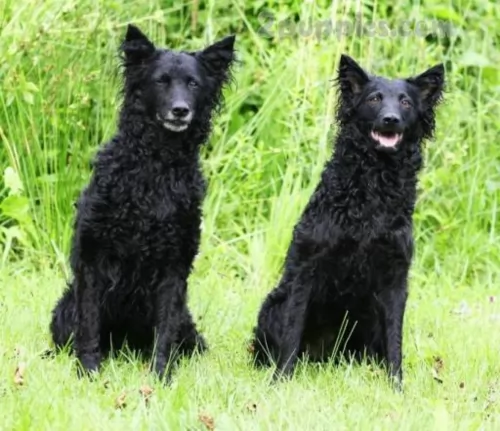 The Croatian Sheepdog has always been a working dog and is regarded as a hardy, low maintenance dog. He will require minimal grooming so a good brush twice a week will suffice.
The Croatian Sheepdog has always been a working dog and is regarded as a hardy, low maintenance dog. He will require minimal grooming so a good brush twice a week will suffice.
There are excellent and convenient dog foods on the market which have been specifically manufactured to ensure your dog gets all the vitamins and minerals he needs for health and energy. Stick to the feeding instructions on the label so that he maintains his lean, muscular body.
Raw meat can be expensive, but it will be to his benefit if you can include some raw meat into his kibble every now and then. If you are unsure in any way as to how to feed your dog, your vet can give you good advice on a food that caters for his age and his activity levels. Always make sure that he has a fresh bowl of water available.